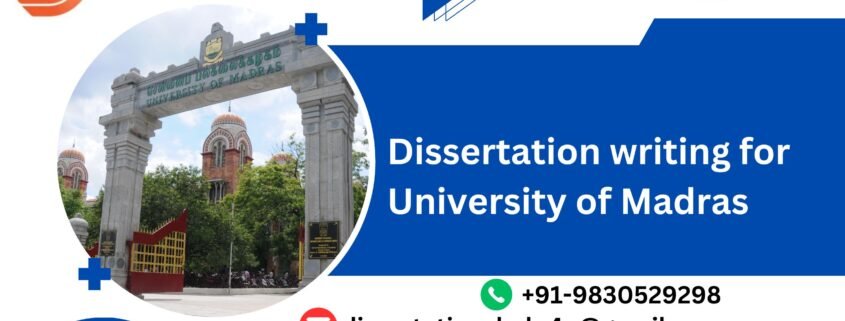Dissertation writing for University of Madras
Dissertation writing for University of Madras
Introduction: Dissertation writing for University of Madras
Dissertation writing for University of Madras. In the academic journey of students at the University of Madras, dissertation writing stands as a crucial milestone. This comprehensive guide (Dissertation writing for University of Madras) aims to provide a step-by-step approach to crafting an exemplary dissertation. Understanding the nuances of dissertation writing is essential for scholars aiming to contribute significantly to their respective fields.
Define the Importance
Dissertation writing is the pinnacle of academic research, allowing students to delve deep into a specific topic of interest. It showcases their ability to conduct independent research, analyze data, and present findings coherently. A well-written dissertation demonstrates scholarly expertise and contributes to the advancement of knowledge in the chosen field.
Types and Categories
Research Dissertations
Research dissertations involve original investigation, aiming to address gaps in existing literature. They may utilize quantitative, qualitative, or mixed-methods approaches to gather and analyze data.
Literature Review Dissertations
Literature review dissertations critically analyze existing research and literature on a particular topic. They synthesize findings from various sources to provide a comprehensive overview of the subject matter.
Symptoms and Signs
Research Proposal
Crafting a compelling research proposal is the first step in dissertation writing. It outlines the research questions, objectives, methodology, and significance of the study.
Literature Review
Conducting a thorough literature review is crucial for understanding the existing body of knowledge related to the research topic. It helps identify gaps, debates, and areas for further exploration.
Causes and Risk Factors
Data Collection
Depending on the research methodology, data collection methods may include surveys, interviews, experiments, or archival research. Selecting appropriate data collection techniques is vital for obtaining reliable and valid results.
Data Analysis
After collecting data, the next step involves analyzing it using appropriate statistical or qualitative analysis techniques. This process helps uncover patterns, trends, and relationships within the data.
Diagnosis and Tests
Statistical Analysis
For quantitative studies, statistical analysis plays a crucial role in interpreting research findings. Statistical tests such as t-tests, ANOVA, regression analysis, or chi-square tests help analyze data and test hypotheses.
Thematic Analysis
Qualitative studies often employ thematic analysis to identify recurring themes and patterns within textual data. Researchers code and categorize data to uncover underlying meanings and insights.
Treatment Options
Discussion and Interpretation
The discussion section allows researchers to interpret their findings in the context of existing literature and theoretical frameworks. It also addresses the implications of the study and suggests avenues for future research.
Conclusion and Recommendations
The conclusion summarizes the key findings of the study and reiterates its significance. Researchers may also provide practical recommendations for practitioners or policymakers based on their findings.
Preventive Measures
Revision and Proofreading
Before submission, it is essential to thoroughly revise and proofread the dissertation to ensure clarity, coherence, and adherence to academic conventions. Seeking feedback from peers or mentors can help identify areas for improvement.
Formatting and Citations
Following the required formatting guidelines and citation style is crucial for maintaining academic integrity. Whether it’s APA, MLA, or Chicago style, consistency in formatting and accurate citations enhance the credibility of the dissertation.
Personal Stories or Case Studies
Student Experiences
Sharing personal experiences or case studies of successful dissertation projects can provide valuable insights and inspiration for aspiring researchers. Real-life examples highlight the challenges and rewards of the dissertation writing process.
Mentorship and Support
Having a supportive mentor or academic advisor can make a significant difference in navigating the complexities of dissertation writing. Mentorship offers guidance, encouragement, and constructive feedback throughout the research journey.
Expert Insights
Faculty Perspectives
Faculty members and subject matter experts can offer valuable insights into the dissertation writing process. Their expertise can help students refine their research questions, methodology, and analytical approach.
Professional Development
Engaging in workshops, seminars, or conferences related to dissertation writing and research methodology can enhance students’ skills and knowledge. These opportunities provide networking opportunities and access to resources that facilitate scholarly growth.
Conclusion: Dissertation writing for University of Madras
In conclusion, dissertation writing is a challenging yet rewarding endeavor that marks the culmination of academic scholarship. By following the steps outlined in this guide and leveraging available resources and support, students at the University of Madras can embark on a successful research journey that contributes meaningfully to their respective fields.
Thank you for read our blog “Dissertation writing for Christ University MBA”. I hope this blog is helpful to you, if you have any question feel free Call / WhatsApp: +91 9830529298 || Email: dissertationshelp4u@gmail.com.
Also read our more BLOG here.
#DissertationWriting, #UniversityOfMadras, #AcademicWriting, #ThesisHelp, #ResearchSupport, #GradSchool, #AcademicSuccess, #HigherEducation, #StudentSupport, #MadrasUniversity, #DissertationHelp, #ResearchAssistance, #PhDJourney, #AcademicGrowth, #WritingServices, #StudyTips, #PhDLife, #GradStudent, #AcademicExcellence, #UniversityLife, #ResearchCommunity
















Leave a Reply
Want to join the discussion?Feel free to contribute!